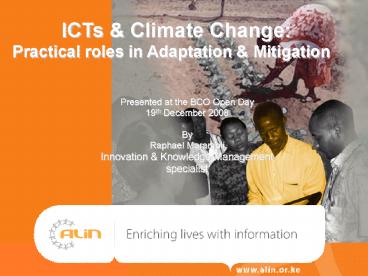Arid Lands Information Network ALIN PowerPoint PPT Presentation
1 / 15
Title: Arid Lands Information Network ALIN
1
Arid Lands Information Network(ALIN)
ICTs Climate Change Practical roles in
Adaptation Mitigation
Is a Network of over 2000 grassroots
development, workers (CDWs) drawn from NGOs,
CBOs as well as government departments, all
offering a form of extension service in their
fields of expertise.
Presented at the BCO Open Day 19th December
2008 By Raphael Marambii Innovation Knowledge
Management specialist
2
Arid Lands Information Network(ALIN)
Is a Network of over 2000 grassroots
development, workers (CDWs) drawn from NGOs,
CBOs as well as government departments, all
offering a form of extension service in their
fields of expertise.
3
Core bizzMissionVision
- To facilitate information exchange among
communities - To enhance livelihoods of communities through
information exchange - A knowledge-driven society
4
EASTERN AFRICA REGION
CENTER LOCATIONS
ALINs COMMUNITY KNOWLEDGE CENTER LOCATIONS
5
ALIN Focus on the Semi-Arid and Arid Dry lands
- The project focuses on the dry areas of Kenya,
semi-arid to arid, pastoral and agro-pastoralist - Areas are chronically food insecure experiencing
frequent food shortages and increased reliance on
relief operations - Are highly vulnerable to climate change effects
6
- Advocacy and Visibility
- Providing technical information on Climate change
adaptation strategies - Providing alternative livelihoods especially for
the youth - Enabling participatory community monitoring,
reporting lobbying to protect their
environments
Practical Climate Change adaptation Mitigation
Roles of ICTs
7
What we do
Info support
Capacity building
8
How-to-do it publications
- Partnerships with research institutions to spread
technologies that address food security. - Information support- Development of small
scale-drip irrigation manual - Information on conservation farming techniques
- Video audio demos
9
Providing Access to Knowledge
- In collaboration with other partners, we
establish and equip Community Knowledge Centres
(CKCs) with ICT equipment to enhance - information access
- Local content creation and sharing
- and new skills development among rural
communities.
10
The Community Knowledge Centres
- Most centres powered by solar energy
- equipped with various appropriate ICT tools that
include a computer, CD-ROMs, a worldspace radio,
printer and GPRS modem card - 3 Centers have now been connected via VSAT
Broadband through collaboration with University
of Michigan
11
Use of Trusted Infomediaries
- These are the people who act as a source of
information and knowledge for the rest of the
community out of duty or social responsibility. - Are of high social standing and regarded as
knowledgeable - Are trusted by communities
- Live and work within communities
12
Sharing Knowledge via Farmer Forums
- Farmers forums organised to share experiences and
knowledge - farmers, local leaders, teachers and extension
team attend the forums - The forums offer a platform for participants to
share info on various development issues - ICTs will provide virtual exchange forums
enabling scaling out of such benefits
13
- We involve the Youth in knowledge activities
at the CKCs. - They assist in content creation and dissemination
- We are training youth on web 2.0 blogs,
podcasting, and various digital media skills - We are also training them as grass roots
journalists - This improves their skills and prepares them for
the job market.
Young Infomediaries
14
- ICTS can increase community visibility and get
their voices heard on difficult issues - ICTs can be developed as a hub facilitating
various business and information services that
help adaptation - ICTs are especially useful to the youth exposing
them to new skills and possibilities - The use of multi media tools simplifys high level
research findings enabling speedier adoption - ICTs are important tools to facilitate climate
change adaptation mitigation
Lessons Learned
15
Thank You!
info_at_alin.or.ke www.alin.or.ke

